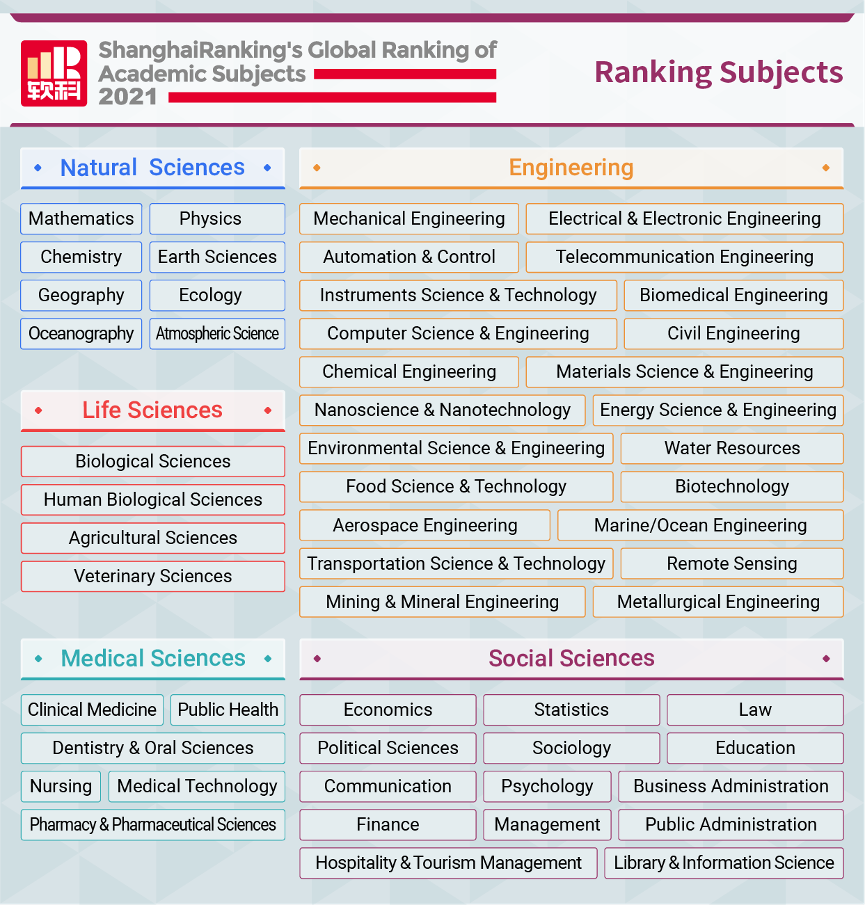ShanghaiRanking's Global Ranking of Academic Subjects Methodology 2021
1. Ranking Subjects
In ShanghaiRanking’s Global Ranking of Academic Subjects 2021, institutions are ranked in 54 subjects across Natural Sciences, Engineering, Life Sciences, Medical Sciences, and Social Sciences.

2. Candidate Universities
The Global Ranking of Academic Subjects has scrutinised the universities that have published a certain number of publications during the period of 2015-2019. The publication threshold is set differently for different subjects. Bibliometric data are collected from Web of Science and InCites.
2021 ShanghaiRanking’s Global Ranking of Academic Subjects Selection of Universities

Web of Science categories are mapped to 54 academic subjects.
Mapping between Web of Science categories and 54 academic subjects

3. Scoring
The Rankings use a range of objective academic indicators and third-party data to measure the performance of world universities in relevant subjects, including research output (Q1), research influence (CNCI), international collaboration (IC), research quality (Top), and international academic awards (Award). The index of international academic awards is based on Academic Excellence Survey (AES) conducted by ShanghaiRanking.
For each indicator, institutions are calculated as a percentage of the top-scored institution, then the square root of the percentage is multiplied by the allocated weight. The final score is obtained by adding the score of each indicator, and universities are ranked in descending order.
In calculating the CNCI score, the maximum value of CNCI in a subject is set as the lower value of: (1) either twice of the average CNCI for all institutions in this subject; (2) or the maximum of the CNCI for all institutions in this subject. The CNCI score of the institution is calculated as the proportion of their CNCI to the maximum value. If an institution’s CNCI is higher than the maximum value, its CNCI score is assigned as 100.
4. Definition of Indicators
| Indicators | Definition |
|---|---|
| Q1 | The number of influential journal publications is an important measure of the research output of the universities in the corresponding subject. Q1 is the number of papers published by an institution in an Academic Subject in journals with Q1 Journal Impact Factor Quartile during the period of 2015-2019. Only 'Article’ is considered. Data are collected from Web of Science and InCites. Publications in different Web of Science categories are grouped into relevant Academic Subjects (Classification of Web of Science Categories into Academic Subjects) . |
| CNCI | Category Normalized Citation Impact (CNCI) is the ratio of citations of papers published to the average citations of papers in the same category, the same year and same type of journal publication, by an institution in an Academic Subject during the period of 2015-2019. A CNCI value of 1 represents world-average performance. CNCI less than 1 indicates that the citation times of this group publications are lower than the average level, while CNCI greater than 1 indicates that the paper's citation performance is above the average level. Only 'Article' is considered. Data are collected from InCites database. |
| IC | International collaboration (IC) is an indicator used to evaluate the level of international collaboration in the respective subject between institutions. The ratio of the number of publications that have been found with at least two different countries in addresses of the authors to the total number of publications in the respective subject for an institution during the period of 2015-2019. |
| Top | Top is the number of papers published in Top Journals in an Academic Subject for an institution during the period of 2015-2019. Top Journals are nominated by distinguished scholars through ShanghaiRanking’s Academic Excellence Survey . In 2021, 164 top journals identified by the Survey are used in rankings of 48 Academic Subjects. In Computer Science & Engineering, 26 selected top conferences are also taken into account this year. Only ‘Article’ is considered for this indicator. But in the subject of Pharmacy & Pharmaceutical Sciences, both "Article" and "Review" are counted because only one journal in this subject was selected as Top journal and it mainly publishes reviews. |
| Award | Award refers to the total number of the staff of an institution wining a significant award in an Academic Subject since 1981. Staff is defined as those who work full-time at an institution at the time of winning the prize. If a researcher retired at the time of winning the award, we count the institution where the researcher’s last full-time academic position was at. The significant awards in each subject are nominated through ShanghaiRanking’s Academic Excellence Survey . 32 prestigious international academic awards across 27 subjects were identified by the Survey. If a winner is affiliated with more than one institution at the time of winning the award, each institution is assigned the reciprocal of the number of institutions. If the award is awarded to more than one winner in one year, weights are set for winners according to their proportion of the prize. Different weights are set according to the periods of winning the prizes, diminishing by 25% each retrograde decade The weight is 100% for winners in 2011-2019, 75% for winners in 2001-2010, 50% for winners in 1991-2000, and 25% for winners in 1981-1990. Nobel Prize in Physiology or Medicine is selected for Biological Sciences, Human Biological Sciences, Clinical Medicine and Pharmacy & Pharmaceutical Sciences. Winners of this award are assigned to one or more subjects according to the topics of their recognized contributions. If a contribution belongs to more than one subject, the winner will be counted once for each relevant subject. |
5. Data Sources
6. Indicators and Weights
Different weights are allocated to the indicators for different subjects, as listed below.
2021 ShanghaiRanking’s Global Ranking of Academic Subjects Indicators and Weights

If you have any questions or comments about the Global Ranking of Academic Subjects, please contact us in the following ways.
Tel: +86 021-3356 2188-8075
Email: pr@shanghairanking.com
